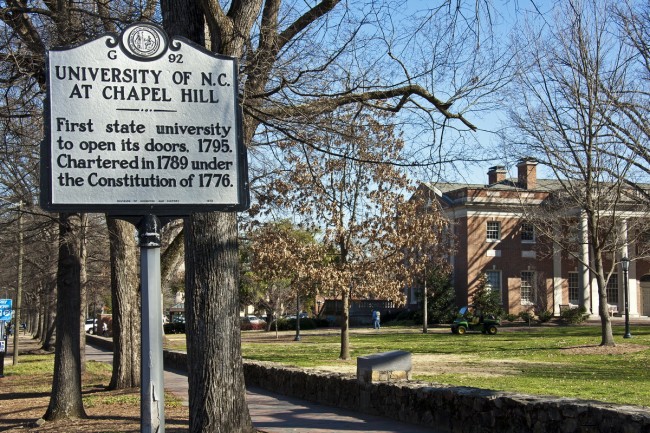UNC system leaders agree that the demand for need-based financial aid will continue to grow. With that will come the challenge to find the funds to keep college accessible to students from low-income families, without placing the burden of high tuition costs on students from other socioeconomic backgrounds.
UNC-Chapel Hill Chancellor Carol Folt spoke to the UNC Board of Governors during a policy discussion Thursday on need-based financial aid within the 17-campus system.
“At Carolina, more than 40 percent of those students wouldn’t be sitting there at graduation if we were unable to provide them with need-based aid,” Folt said.
For the 2012-2013 school year, 59 percent of in-state students received need-based financial aid, according to Andrea Poole, the UNC system assistant vice president for finance.
UNC System President Tom Ross said the growing demand for financial aid is an issue impacting universities nationwide.
“The need is greater than the available dollars—no matter what the source, no matter how you put it together— the need is greater than the affordable dollars. The demographics of this state and the nation are changing in such a way that the need is going to be even greater,” Ross said.
Folt said that without appropriate state funding for financial aid, the campus would suffer in areas that keep it competitive with peer intuitions.
“I think it wouldn’t just simply be in SAT scores and valedictorians, it would also be big changes in our first generation students, our underrepresented minority students, and categories of students in this state that are really important to our success,” she said.
Western University Chancellor David Belcher with Folt on the importance of need-based financial aid, not only to the vitality of a university, but to the economic development of the state.
The federal government is the largest provider of need-based financial aid. During the 2012-2013 fiscal year, UNC system students received $794 million in federal loans and $275 million in Pell Grants, Poole said.
Two major state-funded programs for in-state students are the UNC Need-Based Grant, which allocated $122.5 million in the fiscal year 2013-2014, and the Education Lottery Scholarships, which provided $18 million.
Poole explained that Lottery Scholarships are given to students with greater need.
Each campus within the system also has its own programs to provide financial aid, such as “Campus-Initiated Tuition Increase (CITI),” which sets-aside funding for need-based financial aid from tuition revenues.
As of 2014, CITI is the largest non-federal source of student aid for undergraduate resident students.
Ross added that private universities across the country have also successfully implemented tuition set-aside programs.
Frank Grainger, Vice Chairman of the Board, said that he acknowledges the growing need for financial aid, but questioned the method of hiking tuition for all students.
“It is not a fact that they don’t need the money. We need to find a way to help them get that money. But it is not to take it from another fellow student that is in the school, regardless of what their social status is in the community or state, and give it to someone else,” Grainge said.
Regardless of socioeconomic status, Folt said that all UNC-Chapel Hill in-state students receive a significant subsidy.
The yearly cost of tuition is $24,472, for which resident students receive a $17,463 subsidy, and end up paying $7,009.
UNC-Chapel Hill in-state undergraduate students who receive need-based financial aid have a median parental income of $59,630. In comparison, North Carolina’s median household income is $46,450.
Halfway through the meeting, several Board Members said the discussion was essentially in vain due to a lack of concrete data for each university, such as information about how much tuition is set aside for financial aid.
Chairman Peter Hans tasked UNC System staff with collecting the appropriate data. He said the Board would conduct a more informed discussion at a later date.






Comments on Chapelboro are moderated according to our Community Guidelines